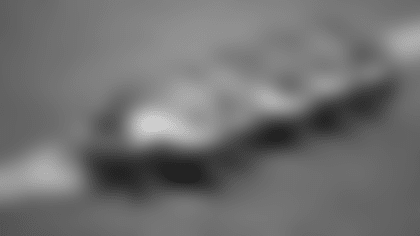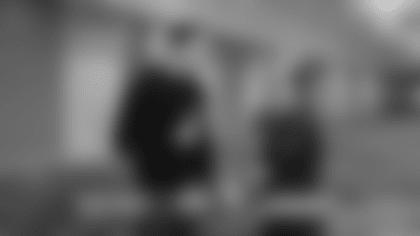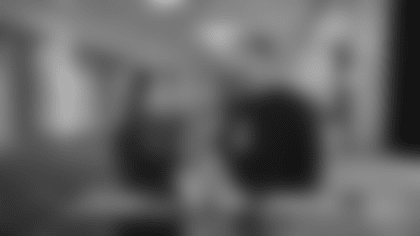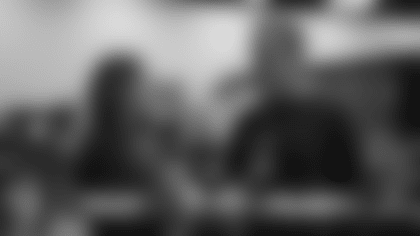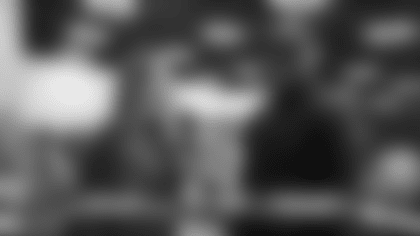Vikings Offensive Coordinator John DeFilippo
It's good to see everybody, I appreciate everyone coming out. Looking forward to going back to Philly and trying to get a win against a really good football team. We're going to have to play well up front and do well on third downs. They're really well coached, they have great speed, and we're going to have to play really, really good.
Q: Both Mike [Zimmer] and George [Edwards] mentioned spending time with you in the offseason going over the NFC Championship game and different things that the Eagles liked against this Vikings defense. Can you take us through that conversation?
A: I was just taking them through some of the ideas we had, some of the matchups we thought we could exploit, those type of things. We were really concerned going into that game, just like you would be playing anybody in the NFC Championship game. The opponent is there for a reason as well. Coach Zimmer's defense is hard to scheme against, it really is. The third down blitz package is tough, the double A's and all those things. So I just shared with them some of the things we did protection wise, and that stuff.
Q: How much does that still happen during the season, when Coach Zimmer can lean on you as a resource, in ways such as, "Here's how I would attack here, here's what you need to think about."
A: Coach and I are always having dialog about that stuff. He'll bring a blitz in to me, or say, "How would you guys protect this against your main protection?" Or, "What would be your answer if we showed you a cover zero look here?" There's always that dialog, and I do the same thing with him as well, "What would you do if we showed this a bunch?" There's constant dialog between Coach and I, which I think is really, really good.
Q: You've been tested with multiple two-minute situations at the end of halves this season. How does your mentality have to change as a play caller in those situations?
A: Depends on the situation, obviously, and obviously how much time [there is]. The half is a little bit different than the end of the game. You want to come away with points, any points, where at the end of the game it could be a field goal or a touchdown. Your mentality, I would say at times that you're probably a little bit more aggressive at the end of the game, if you need to be. You saw us in Green Bay make a couple tight-window throws, those type of things where at the end of the half, not to steal Coach [Hank] Stram's words, but you're trying to matriculate the ball down the field. That's what you're trying to do. It all just depends on the situation.
Q: Is clock and timeout management something that you get more comfortable with the more you do?
A: Sure. The other thing to it is this; I just said you want to come up with points, but there's a protection piece in that as well. You need to make sure that you don't get into an extra-long situation to where you're going to get out of field goal range. Say you have the ball coming out of the second half. Our goal is to get points, and then you double-dip. We call it a double-dip, where you score at the end of the half and then hopefully you can come out in the second half and score again. That double-dip swing points is what you're trying to do there at the end of the half. The whole mentality changes because of the protection piece as well, where you're liable to take a few more chances at the end of the game.
Q: Kirk [Cousins] talked about the fumbles, and the things that he can try and control. Are there things that you saw from the Rams game, when he was back in the pocket and fumbles, which he can possibly improve upon?
A: We work it every day, we work pocket presence and two hands on the ball, and Kevin Stefanski does a fantastic job with that, and it's something that we're going to continue to work on with him. That was kind of a freak play. Some of the other ones, where he had one hand on the ball, I thought there were some that were avoidable. The one against the Rams, he was double clutching and tried to pull the ball back. Sometimes you get in that position, and the defender from the Rams made a great play. We call that half a man, he was half blocked and Riley [Reiff] was trying to run him by, and he just got a hand in there. In that situation in the Rams game he was double clutching and tried to pull it back to reset his feet, but there were times this year, and Kirk said it himself, where he's got to do a better job of keeping two hands on the ball.
Q: Is some of that the depth of where he is in the pocket? On that Rams play, could he have been further up in the pocket?
A: Our mantra is this: climb if you need to climb, slide if you need to slide. If you get into the world of climb, climb, climb, like old school West Coast teaching, you're throwing from a foxhole. You're throwing a grenade from a foxhole. We want to stay back in the pocket at seven and a half yards deep as much as we can. Come to balance at seven and a half yards deep. You don't want to be nine and a half. On some run action, play action stuff, you're going to sit deeper on those things, but we don't want our quarterbacks having to throw from a foxhole with guys in their lap, where they have this short-step, no-step throw. Their arm angle has to change, all of those things. I hope I answered your question there. If you need to slide, slide. If you need to climb, climb. If not, stay back there.
Q: How much is Aldrick Robinson putting himself in a position to earn more snaps?
A: Well his touchdown-to-catch ratio is pretty good. So we'll see, we'll see. He needs to continue to learn the offense, and not just the offense, but the details of it. When you miss as much time and you come in late, obviously he's going to be a little behind, but I'm pleased with where he's at. Obviously he was in Washington, so he knows the quarterback, which is huge. And the quarterback knows him, which is huge. Some of the terminology is obviously the same, the same background, so he knows how to run a lot of our routes, but it's just the details, the splits, the motions, the way we motion, the way we shift, the amount of formations we line up in. Those are the things that he's going to have to continue to master.
Q: Were Robinson and Kyle Rudolph supposed to be on top of each other on Robinson's second touchdown catch that he had?
A: No. They were not. We got knocked off a little bit, and one guy got over there a little bit quicker than the other guy should have been. But no, they should not have been that close together. But hey, it's football. It's players making plays at the end of the day, and the quarterback made a great throw. Obviously those guys made a great play.
Q: How do you weigh wanting to run the ball with the success you have had through the air? Is yards and points the only thing that matters in the long run?
A: I was waiting for somebody to ask me that. Here is the thing. There is no one in this building that wants to run the ball more than I do. Because it takes a lot of pressure off of me to not have to have the perfect protection, to not have to call the perfect route against the coverage that you deem you think you are going to get. The quarterback in duress at times where if you run the football with efficiency, obviously it is a lot easier on the play caller, it's easier on some of the players. But at the same time there is a fine line. There is a fine line when you say balance. As the offensive coordinator, take the winning and losing out of it. We all know when we get on the bus, we all know whether we won or lost. We all know that. The whole world knows that. I feel like I did my job as a play caller as an offensive coordinator if our best players were the ones, our playmakers, were the ones that touched the ball in space and gave them a chance to help our team win. We all know who those players are. We don't need to name them. If those guys are targeted, catches, our time of possession is still good, we're efficient in the red zone, we're efficient on third down then at least we gave our team a chance for success. It doesn't mean we won, but we gave our team a chance for success. The long-winded answer to your question, I apologize, is do we want to run the football with more efficiency? One hundred percent. And we are grinding our butts off to make that happen. But at the same time, the Rams game, Aqib Talib is out. Marcus Peters is on one leg. I like our matchups on the outside more so often than trying to bang our heads up against Aaron Donald and Ndamukong Suh. Like I said, there is no one that wants to run the ball more than me. We are going to try to establish that and continue to keep grinding on that. At the same time there is a fine line of doing something just to do something and maybe taking some success away from your team. I hope I answered your question there.
Q: With the production of Stefon Diggs and Adam Thielen is this level of production through four weeks sustainable?
A: We have high expectations. Yes. We have high expectations for everybody, myself, our players. We take a lot of pride in trying to get our guys in the right spot. I think that is why you see us line up in so many formations. So many guys in different spots, we try to do that and there is a reason for it. But yes, we knew those guys were going to come in and be productive. They are playing really well. Just call it what it is they are playing really, really well. We are throwing it well and we have to continue to do that but with more balance if possible.
Q: Will going back to Philadelphia be emotional for you at some point?
A: It will be. And not just because of the Eagles thing. A lot of people don't know that I went to high school in Philadelphia. My dad was the athletic director at Villanova. I spent some of my formable years in Philly and was kind of in the middle of the Philly sports scene with my dad. I went to high school there with my high school buddies and all of that. But once the game starts, it is going to be like any other game. I have nothing but the utmost respect for everyone in that building. Just like this building, there are some really phenomenal people, coaches, players, ownership, personnel in that building. It is a first class place, no doubt.
Q: What are your biggest memories of growing up in the sports scene in Philadelphia?
A: Probably going to Eagles games. Probably going to Eagles games and I was at a lot of the Monday Night games which was really cool. I always ask the quarterbacks a trivia question. I saw Shawn Bradley's first game as a Sixer and he was not the tallest person at the tip. Bingo. Gheorghe Mureson. Right. You were the first person to get that quick by the way. Those are the memories you have. You are 12, 13, 14, 15, 16 years old. You are around these guys. You are rubbing elbows with guys from the Sixers through my dad, and the Eagles. You are getting to go to training camp as a kid. Then to be working there was kind of surreal to be quite honest with you. The first time you walk in the building was "whoa". It's your hometown team. But like I said, I haven't thought about it that much just because you are so busy grinding for the game. I have very fond memories but not only Philly, but the Eagles.
Q: What is the biggest thing coaching with the Eagles that you took with you?
A: I think Coach [Doug] Pederson. I'll just talk about Coach Pederson for a second. He is great. He is great. There is two things that Coach does that I really learned from him. Number one, don't be afraid to think outside the box. Don't be afraid to think outside of the box. Be aggressive. He is an aggressive guy. He is an aggressive play caller. Number three, he really trusts his assistant coaches. He really trusts his assistant coaches. If he gave you a job to do, he would let you do your job. He trusted you to do your job. If you were doing your job, he would let you run with it and take something and make it better. That was my goal everyday. To try to get the quarterbacks of the Philadelphia Eagles, number one, two and three to get better each day. He trusted me to do that and gave me a lot of leeway and a lot of room to do that. I thanked him for that when I left. Those three things I learned from Coach. I think he does a fantastic job. Not only is he a great coach, he is even a better person. I really like Coach P.
Q: What is it like as a coordinator when Kirk Cousins is not getting the play call through his speakers in his helmet?
A: I was not too happy about that. Usually, you read the body language of the Q. He is usually going like [shrugs] giving me one of those, something of that nature. We are prepared for that situation. Our quarterbacks have a call for every personnel grouping that we have on the field for first and second down call, run and pass, and a third down pass. We are prepared for that situations. That happens all the time. Especially, just Google it, certain venues in the NFL are more so than others. You are always ready for that situation.
Q: Was the two-point conversion the play you would have called or would you have gone with something different?
A: Something similar. Not the exact formation. But something similar. That is what is great about having smart players. The guys that know situational football and buy into situational football. That is one of the benefits of having smart players. I am leaving people out but you have guys like Kyle Rudolph and Kirk Cousins and Adam Thielen and Stefon Diggs and Riley Reiff and Pat Elflein. Those guys are smart guys. I apologize to anybody on offense that I left out there. Those guys are smart guys. They just handled a very tough situation and they handled it right.
Q: As you try to find a perfect combination of protection packages, do you still see an opportunity to potentially experiment with moving guys around on the offensive line?
A: We are always looking for ways to get better. If that means potentially moving some guys around, then we will give it a shot. I don't see that happening in the near future but you never know. You never know. We are going to continuously always self-evaluate ourselves to see if we can do things better.
Q: Was there anything about coaching Carson Wentz that stood out to you from any other quarterback you have coached before?
A: Yes. A lot of things. The first thing is the amount of maturity he has for his age. Not only football maturity but maturity in general. He is very, very confident in himself but to a point where it rubs off on others in a good way, not a bad way. The whole team just kind of felt his confidence and felt his swagger and juice and fed off that. And really just his freak athleticism to be quite honest with you. The guy is 6-5 and 240-something pounds and can run like that, throw like that, throw off balance, get out of traffic, extend plays, There are some plays you watch last year and not a lot of guys get out of that. The last thing is just his football knowledge for a rookie. Even when he came in, I don't want to say it was off the charts, but it was pretty close for a rookie. It was pretty good. Real good, actually.
Q: How much Philadelphia's defense miss Rodney McCloud?
A: Rodney is a really good player. I know this. Rodney is a darn good player. He is fast, he has great instincts. He is not afraid to come out of center field to try to rob something and take a chance. You always have to have your eyes on Rodney when you are playing against him. Even when I was in Cleveland when we played him and he was with the Rams. You always had to know where he was at. Ed Reed-ish almost. Freelance at times, but always make the right play. Obviously his football I.Q. is really good and obviously he is a great athlete. You would have to ask those guys how much they miss him. I just know Rodney is a heck of a player.
Q: Is it important in today's league to have two top notch receivers?
A: It sure helps. It sure helps because especially when you stick guys in different spots as much as we do, it's hard for defenses to hone in on where everybody is going to line up. Whether you have an elite tight end and elite wide-out, or two elite wide-outs, I think that obviously gives you so much more flexibility to do some neat things and to line up in different things and run different routes. At the same time that's awesome but everything begins and ends in the protection world in the passing game.
Vikings Special Teams Coordinator Mike Priefer
Most importantly is the game this weekend in Philly. Real quick on the game last week quick, I know it's been a week since we played and I want to tip my hat to a few of the guys that played for us. Mike Hughes and Holton Hill did a phenomenal job on stopping the fake [punt]. We had practiced that. We had shown on tape, even though it was a short week we knew that was their mentality in there, but I mean a punter that can throw the ball. Our guys did a great job stopping that fake and giving our offense field position at the 35-yard line. So that was a big play for us. Dan [Bailey] came in, made his kicks. Kevin [McDermott] had that freak injury and David Morgan, once again, comes off the bench and snaps for us and he had never snapped before Green Bay last year. We keep training him. When he was hurt Tyler Conklin was the next guy and we just keep doing this. It's crazy. I've never had this happen this often. Funny thing about David is on the sideline he was kind of getting a little nervous. He goes "man, where's Kev? Is he coming back out? Is he coming back out?" I'm like he's going to be fine, but you know we're going to need you to step up here and unfortunately he had told me last year in the Green Bay game that he was terrified and I didn't know that during the game because he had reacted so well and did a great job in the six degree weather. So my only coaching point to him was number one, worry about snapping the ball and don't worry about protection on punt and field goal. We'll be fine, they'll help you out. Number two, it's like 75 degrees warmer now so you're going to be just fine and of course the very first practice snap went sailing over Matt's [Wile] head and then I got real nervous. But, no, David did a great job for us and he stepped us for us once again on both punt and field goal protection. Our punter did a great job getting it out because we knew they were going to come after us. It was a 1.53 get off on the PAT and because Dan had to make sure the ball was down and our guys protected their tails off and did a great job, so I was proud of that. I proud of the way we covered the punt and covered the two kickoffs, made good decisions on kickoff return. I thought we out played them and we won the field position battle. Made our kicks, they missed a field goal, and we stopped the fake like I said. Overall I was really pleased with what we did last Thursday.
Q: What is the process like getting a backup long snapper ready throughout the week in practice?
A: Well, we only do it on a day like today, Thursday after practice. We have the backup snappers, backup holders each work. They do work for about 10-15 minutes after practice. The reason that is important is obviously, it's happened to us now twice in less than a year. Does it happen to a lot of teams? I don't know if everybody has a backup snapper, but I do know that we had Jared Allen here and he was drafted as a snapper so it was never a big deal. Chad Greenway was a great backup snapper. Adam Thielen is probably our best backup snapper. I'm certainly not putting a Pro Bowl receiver in there on a punt or a field goal to get hammered. I think I'd be in trouble for that one. When David got here two years ago we made sure that we started training him. Tyler Conklin we've been training him. There's offensive linemen we've trained to be backup field goal snappers as well, so that's always a constant process that we always have to work on just in case.
Q: Adam Thielen learned that when he came here, correct?
A: Knowing Adam like we all know Adam he thinks he can do everything. I'm sure he thought when he got here he could do that as well, but he's a pretty talented athlete. He can zip it back pretty good.
Q: What did the trainers say to you? Did they say to you that your long snapper lost part of his finger?
A: Yeah, Eric Sugarman does and the whole training staff, they do a phenomenal job immediately, no matter who gets hurt, they come up to me after they let Coach Zim know. They come to tell me and it's important for our depth chart and moving people around our depth charts and all the phases. Eric Sugarman came up and said Kevin is in the locker room. He hurt his finger. Alright, no problem. I went immediately and found David [Morgan] and we got to move on. Then I went back to Sug afterwards and he told me what happened and then the first thing Kevin said to me, "Hey Prief! I lost half my finger." I said congratulations, right now here's what we got to do to win this game. So we addressed that afterwards. I'm proud of Kevin [McDermott] and what he did. He's a tough guy. I know he's gained a lot of notoriety from what he did from a lot of people. I had some guys that coached before Lonnie Paxton, I coached him in Denver and he said, "Man that's insane." What a stud Kevin is after the game and all that stuff. I was real proud of him and how he responded and how he snapped quite frankly after that because that takes a tough man to do that.
Q: What's been the challenge with the constant rotation of guys returning the ball?
A: It's kind of like with snappers or with holders or with any position on special teams, we constantly have to have guys ready and getting Holton [Hill] some work in the preseason really helped. Aldrick Robinson is a guy that's fast and maybe two or three reps in his career before he got here. Working with different guys as punt returners, kickoff returners – Brandon Zylstra did it in Canada as a punt returner, so he could be a backup for us. There's a lot of different guys, different athletes that you just have to make sure you get reps. That's the biggest challenge, making sure they get enough reps in practice, pre-practice, during practice, post-practice that when they are called upon in the game that they're confident enough they're going to catch the ball. I tell all the returners number one it's ball possession. I don't care if we get any yards, we have to maintain ball possession. So, that's the key. That's what we need to continue to work on no matter who's back there. We knew that Mike [Hughes] at some point was going to be playing a lot of defense, he's so talented. Whether he's the punt returner this week and then backup kickoff returner or vice versa we just got to have guys ready.
Q: What do you do when Mike Hughes was just in for long defensive possession?
A: I make eye contact with him, I look at his body language, and I say I got you – one of those deals. So we always make sure we have guys ready. Then Coach [Ryan] Ficken does a great job with me and he'll go grab Holton or go grab whoever the next guy is.
Q: Is Kevin McDermott on a snap count in practice?
A: The ball was wet yesterday, so a little bit, but that's just him getting used to the grip. He had a brace on Monday that he had to change because it was bent the wrong way or whatever, so it didn't feel right. He got it changed, now he's good to go.
Q: Marcus Sherels is a guy that doesn't say much, but when he is injured and on the sidelines how much of a help is he with coaching up some of the young guys?
A: That's a great question. He does a great job with our guys. In pre-practice he'll be back there talking to them. He'll talk about elbows and hands; the things he and I talk about all the time, the things we don't have to coach him on that anymore. I do if I see something, but he's another coach on the field on the practice field and he's been tremendous helping with the gunners in the gunner's meetings, talking to guys about kickoff as a safety in kickoff meetings, and talking punt returners and kickoff returners and everything in between. Everybody respects him so much for what he's done in this league and who he is as a man. He is quiet, but he does some quiet coaching on the side and really helps those young guys out.
Q: What kind of help can Kentrell Brothers be now that he's back?
A: Kentrell's got experience. It's his third year in the league he came back and it looks like he's in really good shape, which was obviously the challenge for him. It was tough for him to be away, it was tough to have him away. I'm glad he's back and it looks like he's in shape, so I hope to use him this week and it's not, it's obviously not my call whether or not he's active, but we're going to prepare like he is and then we'll have somebody ready if he's not.
Q: If Marcus Sherels was to return this week, how much of a spark would he be?
A: The Rams they punted, they lined up the punt three times and the dude shanked two of them and he's one of the best punters in the league. We put a lot of pressure on him on the first one. The second one wasn't as much pressure. He shanked both of them and one was the fake that we stopped. If they want to shank to 32, 33-yards that's a win for us, especially a good punter like that.
*Q: You've gotten to know Stephen Weatherly quite well over the last few years. He's a different guy, he does stuff off the field with instruments and things. From your perspective how is he in meeting rooms? He is obviously transitioning after filling in for Everson Griffen. *
A: I like Stephen a lot. He's very intelligent. He's a guy that is a smart football player, too. The regular intelligence of a normal human being does not always translate to football intelligence and I think with Stephen it does. He does a really good job of studying tape. He does a really good job of who he's blocking on kickoff return and punt return. He understands. He studies who's going to be rushing his gap when we're on punt protection. He's been great. I love having him, miss him right now because we can't use him as much for the reason that you just said. At the end of the day, he still comes to meetings like Andrew Sendejo and Harrison Smith, and Adam Thielen and a lot of those guys still come to meetings even though they don't play as much as on special teams because they know they need to be ready like Andrew Sendejo filled in on punt last week when Anthony Harris was out. He ran our punt team as a first protector, we call the fullback but guys like he and Stephen, those type of athletes they're valuable because then they show the young guys how important special teams is and I think I can say because that's my job. But when our veteran guys prove it to these young guys that special teams is indeed important to our football team and the success of this football team having guys like that in our locker room really helps.
Q: How has Marcus Sherels as a pure punt returner been able to continue his success for so long?
A: Number one, great ball security. He tracks the ball well. He catches the ball well. He catches the ball the same every time it hits. These young returners, Lindsey asked about him helping out the returners, the younger ones. They're baffled about how consistent he is in catching punts it's amazing. He gets squared at almost every punt. His knee bend is perfect. His start is perfect. He's got a phenomenal first step, all that plays into him being successful. All those little fundamental things a lot of people don't understand or don't talk about, Marcus has got it and he's got enough quickness to make people miss, speed to out run people to the goal line and not go in a line. Obviously, he's been very successful. We've missed him the last couple of weeks and I hope we get him back soon.
Q: Is there a mentality that no one is too good for special teams?
A: I think when you come to the NFL all 32 teams should have that mentality. Depends on what schools some of these guys come from. Some of the schools they come from the University of Minnesota I know they stress it, my son's there and I know Coach Fleck does a great job of stressing special teams. Urban Meyer does a phenomenal job at Ohio State. I think the college teams that emphasize special teams, especially the head coaches and then it translates into a good special teams player in the NFL too. I know the guys who come from Notre Dame have always been good special teams players. They've always had right mentality. I think they also have that great mentality and some of them that don't then some of them that don't, then they get left behind. Unless you're good enough to play on offense and defense on every snap then they get left behind.
Vikings Defensive Coordinator George Edwards
In the middle of preparing for Philadelphia. Offensively, they pose another big-threat offense that we know we'll have to do a good job of being disciplined with techniques and fundamentals as we work through the process of the week, which we're doing now. We look to come out and get back to a lot of the basic things we've been able to accomplish.
Q: Is there something that you need to see from George Iloka before he gets more reps?
A: I think right now the way the rotation has been going, we feel pretty good that he has a good understanding and good grip of what we're doing defensively. It just depends from week to week which packages we have up, but we have confidence in him. He's worked hard since he's been in here, and possibly it will show up some this week.
Q: Did you talk with Coach DeFilippo this week about what Philadelphia likes to do?
A: This week I think he's got to concentrate on what he's doing, but we spent enough time in the offseason talking to him schematically about some of the things that they've liked against us, and some of the things that we need to do in preparation for this match.
Q: When you see teams running as much misdirection and motion as Philadelphia does, how do you neutralize that and still get to the quarterback?
A: It makes it tough, because you're dealing with a lot of seven and eight-man protections. A lot of times it's just two receiver routes, and they may leak the back out late, but that's the problem that has shown up. We've got to do a good job in those down and distances of doing some things that counter it, and hopefully we can get back on track this week.
Q: What are ways that you can counter the play action game giving receivers extra time to break off and get open?
A: There's a lot of different things we can do. As far as with our defensive front, whether we're adding rushers to it, there's multiple things schematically that we're going to try to do. I don't want to get into that going into the game, but that is an area that we are concentrating and focusing on. Hopefully we can get better at it this week.
Q: How much does the film from the NFC Championship game aid your preparation?
A: Of course it's a part of the preparation, no doubt about it.
Q: What do you make of how often teams are using jet sweeps now?
A: The rocket motion, the ghost motion, those things have shown up predominantly in every week thus far throughout the course of the season thus far. It's something that is not going away, so we got to do a better job with how we leverage it and how we do things in coverages to make sure that we take care of the leverage and the coverage. It's really just an awareness thing, and we got to get better at the techniques and fundamentals with it.
Q: How do you value the play of Stephen Weatherly?
A: He's done pretty good. We think he's been consistent throughout the time that he's had to go out and start and play for us. Just looking for him to keep continuing to get better.
Q: What would you attribute the team's struggles defensively thus far to?
A: I think the biggest thing for us defensively right now is getting back to the basics of technique and fundamentals. We've had a lot of guys in and out of the lineup, but still, for us right now we can control the things that we can control and we can do a better job of that in our preparation and a better job of executing it on Sunday.
Q: Do you anticipate Trae Waynes being available on Sunday?
A: That's something that you'll have to take up with Coach [Zimmer]. I'm not allowed to talk about injuries or any of those types of things.




